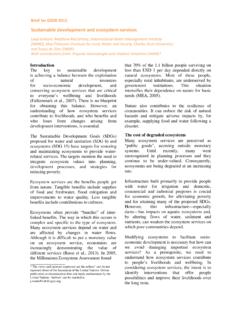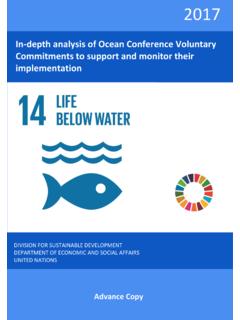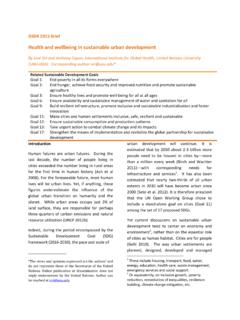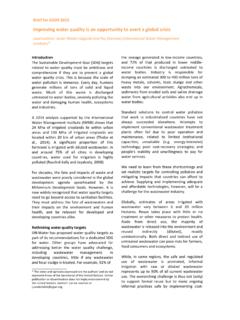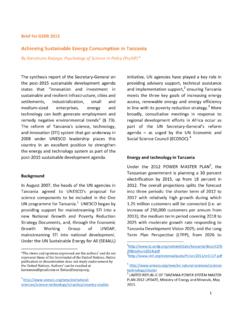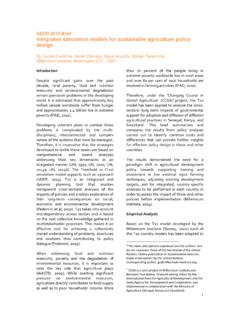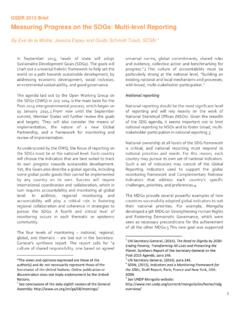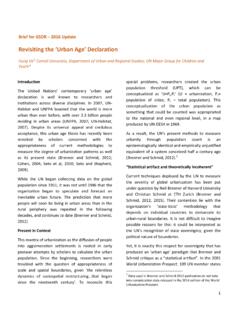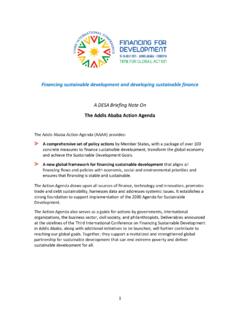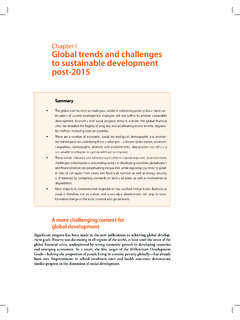Transcription of CSR and Developing Countries - United Nations
1 Issue 1 February 2007 The concept of corporate social responsibility (CSR) aims both to examine the role of business in society, and to maximise the positive societal out-comes of business practice, much of the business activity that has so far been labelled CSR has been driven by the con-cerns of investors, companies, campaign groups and consumers based in the world s richest Countries . National CSR agendas in middle and low-income Countries have been less visible internationally, and have often not been labelled CSR . The result has been CSR practices that are largely framed in rich Countries , then internationalized and transferred to other businesses and social settings through international trade, investment, and development assistance. The strategic challenge for governments at national and local levels is how best to shape an agenda that has been largely market-driven and responsive to concerns of rich country the past five years or so, governments, com-panies and NGOs in many middle-and-low-income Countries have accelerated a process of adapta-CSR and Developing CountriesWhat scope for government action?
2 What CSR is notAt its broadest, CSR can be defined as the overall contribution of business to sustaina-ble development it is in that sense that it is used here. Defining corporate social respon-sibility in more detail than this remains a vexed issue. In practice views differ based on two factors. First, the extent to which impor-tance is placed on the centrality of the finan-cial business case for responsible business behaviour in defining the scope of CSR prac-tices the extent to which tangible ben-efits to companies must be demonstrable. Secondly, the extent to which government is seen to have a role in framing the agenda and how. A minimum standard for CSR might be that businesses fulfil their legal obligations or, if laws or enforcement are lacking, that they do no harm . A median approach goes beyond compliance, calling for businesses to do their best, where a business case can be made, to contribute positively to sustainable development by addressing their social and environmental impacts, and potentially also through social or community investments.
3 A maximum standard points toward the active alignment of internal business goals with externally set societal goals (those that sup-port sustainable development).This Brief is based on a background paper prepared by Halina Ward, Emma Wilson, and Lyuba Zarsky, from the International Institute for Environment and Development (IIED), and Tom Fox (UNDP). Corporate social responsibilityPublic policy and public sector actors in middle and low-income Countries are increasingly confronted with issues related to Corporate Social Responsibility (CSR). This paper presents the range of opportunities that exist for them to mitigate negative impacts of CSR but also to harness its potential positive benefits for public policy. Government involvement is illustrated through examples of policy instruments and programmes promoting CSR in Developing publication of the Policy Integration and Analysis Branch of the Division for sustainable DevelopmentUnited NationsDepartment of Economic and Social AffairsSustainable Development Innovation Briefs February 2007 tion of the developed-country-driven CSR agenda through greater direct engagement.
4 CSR movements and initiatives have emerged in Countries such as China, India, South Africa, the Philippines and Brazil, among others. Governments of some middle-income Countries facing major social challenges have explic-itly sought to engage business in meeting those challenges, as with Black Economic Empowerment in South Africa, or Presidential encouragement of busi-ness efforts to tackle poverty in the developed Countries too, there is increasing rec-ognition among companies that a one-size fits all approach to CSR in operations around the world is ineffective in responding to the business drivers of socially responsible behaviour. The result has been reinvigorated focus on themes of greater importance in middle and low-income Countries including the value of sustainable local enterprise and the role of business in poverty Developing country governments should be interested in CSRT here are two broad sets of justifications for public sector actors in middle and low-income Countries to engage with CSR: defensive and proactive.
5 The two are not mutually exclusive: a policy initiative that initially has a defensive justification may quickly become part of a proactive strategy of defensive justification relates to minimizing the potential adverse effects of CSR on local communi-ties, environments and markets when it is imposed through international supply chains and investment. Governments of some major middle-income eco-nomic powerhouses such as China have undertaken a variety of initiatives to ensure that CSR practices with impact in their Countries are tailored to national economic and social of corporate conduct and certification schemes applied in international trade have become particular areas of concern. Codes of conduct implemented through supply chain requirements and enforced through audits can provide positive opportunities for niche marketing by producers and suppliers based in middle and low income Countries .
6 But they can also act as a barrier to market access. This is particularly a concern when certification requirements, or the cost of meeting supply chain requirements, harm the local small or medium-sized enterprises that represent the large majority of enterprises and account for a significant part of employment in Developing experience of business-to-business standards is that costs and benefits tend not to be equitably distributed along value chains, with costs of private standards borne by producers whereas benefits accrue to the retailer. These issues are partly rooted in bargaining power disparities between producers and buyers. Similarly, assurance schemes say very lit-tle about the responsibilities of sourcing companies; the onus is on the producer to comply. Depending on the strength and durability of ties, however, between buyer and supplier, the former may have an incentive to assist the latter with compliance.
7 Further problems arise for supplier firms that have to comply with mul-tiple, even conflicting, codes of different concern is that CSR standards imposed through supply chains can supplant domestic legisla-tion. This may be because they are more closely linked to commercial outcomes (market access) than domestic legislation that reflects less stringent standards or because, where there is weak public sector capacity, they are more likely to be monitored and enforced than domestic can also arise because CSR standards are frequently designed and applied with little or no input from governments or firms in supplier coun-tries. As a result, standards may do little to achieve social and environmental goals in exporting coun-tries. For example, EU Ecolabelling Regulation criteria for paper products became controversial in the 1990s because they favoured energy efficiency, not use of renewable energy sources such as hydropower which were important for producers in CSR activities on the ground also have the potential to generate or exacerbate social tensions at local level.
8 For example, social invest- ment programmes that focus exclusively on indig-enous people may serve to heighten social tensions between indigenous and non-indigenous members February 2007 sustainable Development Innovation Briefs of mixed communities. Also, they might prioritize issues that are most subject to international cam-paign pressure. For example, community action groups have complained that multinationals working on Sakhalin have prioritized spending on research into the endangered Western Pacific grey whale over support for local socio-economic proactive justification for public sector actors to engage with CSR is provided by the opportunity to increase the domestic public benefits of CSR prac-tices in economic, social and environmental Countries whose export sectors are closely associ-ated with consumers social, health or environmen-tal concerns ( , in agriculture and textiles), there may be positive opportunities for governments to facilitate market access gains for their producers.
9 For example, the government of Zambia is working with the WTO/UNCTAD International Trade Centre and the Utz Kapeh Foundation to improve access to high value markets for Zambian coffee growers, in part through the creation of local inspection capacity intended to reduce the cost of certification needed in those markets. And Colombia s Mercados Verdes programme, which is designed to incentivise produc-tion of environmentally friendly goods and services that are competitive in international markets is seen by commentators as a leading example of public sec-tor support for sustainable markets in Latin investment offers potential to transfer technical expertise to local enterprises. Many large companies (encouraged by governments) are inter-ested in exploring practical mechanisms for enhanc-ing the input of local enterprises, and locally hired workers, into their projects. In some cases, this is encouraged through investment incentives ( in Nigeria) or through the terms of foreign investment contracts ( with oil industry investors in Azerbai-jan).
10 In others, various kinds of partnership initiative seek to transfer knowledge and expertise, including on environmental and social issues, between large and small , a number of analysts and govern-ments are also beginning to explore the hypothesis that promotion of CSR in the domestic economy can bring benefits for competitiveness as a whole. The extent to which this happens, however, is likely to depend on the sector and country-specific broadly, there is also scope for public sector actors in middle and low-income Countries to harness enthusiasm for CSR to help deliver public policy goals and priori-ties. These avenues will be explored roles of governments in the CSR agendaFrom a sustainable development perspec-tive, public sector engagement with CSR potentially spans social, economic and environmental spheres, including issues of corruption, poverty reduction and human rights.
